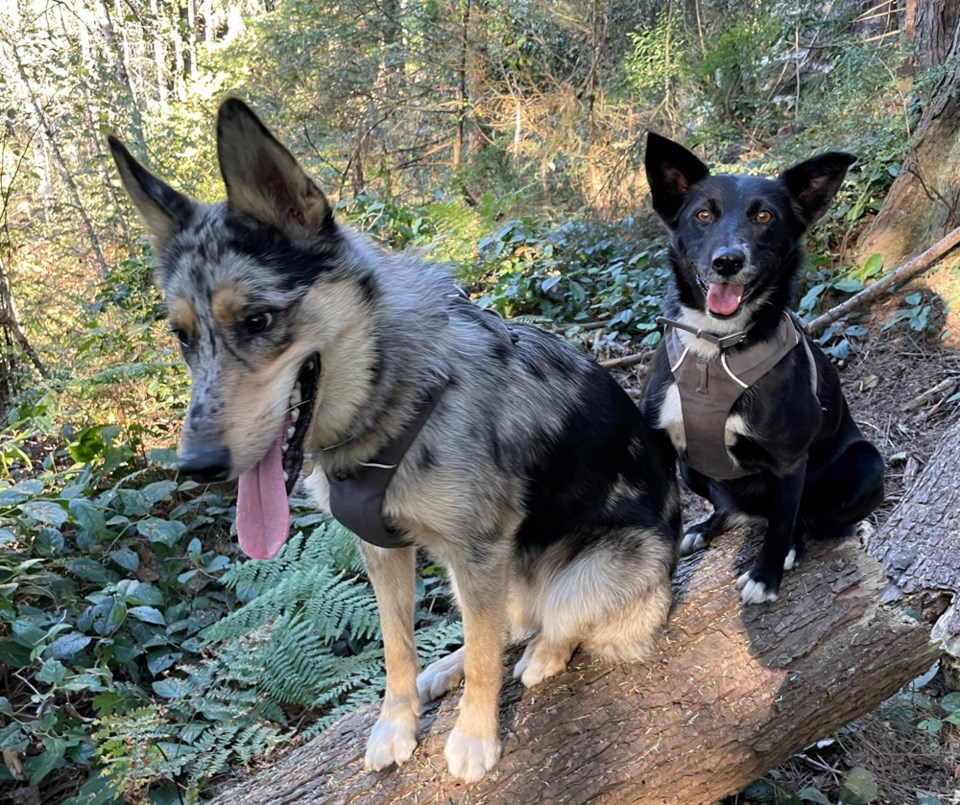Metro Vancouver is warning the public and enforcing new on-leash areas around Rice Lake in Lynn Headwaters Regional Park, after incidents involving coyotes attacking dogs and people in the area.
Elliott Marsh was out for his usual morning run with his husky-cross rescue dogs Kaia and Quinn Wednesday when the dogs took off down an embankment around 10:30 a.m.
Soon after, Marsh described what sounded like a “dog fight” and he sprinted to the area where they were.
“I just saw our bigger dog Quinn running up from the river towards me, with two coyotes in hot pursuit,” he said.
The coyotes dispersed and soon after, Kaia emerged from the undergrowth, also with more persistent coyotes “hot on her tail.”
“She had some more significant damage. She was bleeding from her head area at the time and from her haunches,” he said.
Marsh grabbed a branch to protect his own pack and fend off the coyotes.
He rushed both dogs to the vet for an assessment. Kaia had to have her ear repaired as well as treatment for puncture wounds. Quinn’s injuries were more superficial. Somewhere in the fracas, Marsh wound up with a wound on his ankle, which he will be getting a precautionary rabies shot for.
“We were lucky,” Marsh said.
Metro Vancouver makes trail on-leash only
In response, Metro Vancouver issued a statement Thursday saying there are coyote mothers with young pups in the area and that the Lynn Headwaters Connector Trail will be an on-leash trail until further notice.
“We've been seeing an increase in coyote activity in the forested areas around Rice Lake, probably at higher levels this year than we've seen in the past,” said Jessie Montgomery, division manager for environmental management. “The most important thing that people can do to protect their safety… is ensuring that your dogs are leashed when in the area where there's potential for wildlife encounters.”
Staff have since posted signs around the area warning of the incident and new rules.
Marsh said he later learned that there had been similar skirmishes with coyotes in the same area in recent weeks. Had he known that, Marsh said he would have kept the dogs on leash or chosen to run in another area.
“I think at least having that information out there allows people to make good, informed decisions,” he said. “It's just important as a community that we acknowledge the fact that we're on their turf.”
Most of the reports of conflicts with coyotes have been coming in third-hand, Montgomery said, so anyone who has a run-in with a coyote should report it to Metro staff and to the B.C. Conservation Officer Service’s RAPP line at1-877-952-7277.
If you do wind up face-to-face, with a coyote, it's best to make yourself look big and tell the canid in a firm voice to back off.
Coyote behaviour explained
Lesley Fox, executive director for the non-profit wildlife advocacy group Fur-Bearers, said she approves of Metro’s decision to make more areas on-leash only for dogs, which have a habit of inadvertently instigating conflicts when off the leash.
“When dogs are off-leash during a wildlife encounter, it can exacerbate the situation,” she said. “Our domestic pets can be extremely curious and confrontational and wildlife will react like wildlife and they will become extremely defensive and protective, particularly if they have a family.”
Denning season is coming to its end and the wild coyote pups will soon be dispersing but Fox said anyone walking in the trails should expect the local wildlife to be territorial.
Coyotes generally are shy, non-aggressive animals that scare easily. There is nuance in their behaviour and it shouldn’t be interpreted as aggressive, Fox added.
“The coyote is sending a message that ‘I need you to leave the area,’” she said. “It's a defense behaviour that's rooted in fear for their young.”
Fox and Montgomery both stressed that feeding coyotes, either deliberately or inadvertently by leaving food behind, will stoke future conflicts as it conditions the wild animals to expect or demand food from other humans they encounter.
In any event, people visiting the trails should be willing to change their habits to accommodate nature, Fox added.
“We carved the city out of a rainforest. Expect wildlife. They live here and the North Shore in particular is home to all kinds of different species, including some of the larger carnivores, black bears, cougars, coyotes, and they are a natural normal part of the landscape,” she said. “We're not going to be able to sanitize, nor should we sanitize, nature to remove or exclude these carnivores. They have an important role in maintaining our ecosystem and biodiversity. We want them there. They actually contribute to our beautiful forests in many different ways.”



